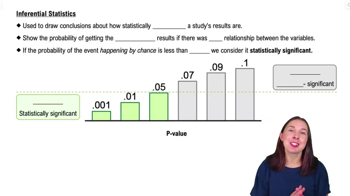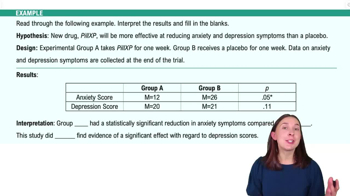Table of contents
- 1. Introduction to Psychology1h 43m
- 2. Psychology Research2h 20m
- 3. Biological Psychology2h 41m
- 4. Sensation and Perception28m
- 5. Consciousness and Sleep32m
- 6. Learning41m
- 7. Memory34m
- 8. Cognition37m
- 9. Emotion and Motivation35m
- 10. Developmental Psychology33m
- 11. Personality48m
- 12. Social Psychology41m
- 13. Stress and Health41m
- 14. Psychological Disorders44m
- 15. Treatment47m
2. Psychology Research
Evaluating Research Findings
Struggling with Psychology?
Join thousands of students who trust us to help them ace their exams!Watch the first videoMultiple Choice
Compared to the others, which person might be LEAST likely to make the list of people who achieved self-actualization, as described by Abraham Maslow?
A
Albert Einstein
B
Mahatma Gandhi
C
Harriet Tubman
D
Herschel Walker
 Verified step by step guidance
Verified step by step guidance1
Understand the concept of self-actualization as described by Abraham Maslow. Self-actualization is the realization of one's potential and the development of abilities and appreciation for life. It is the highest level in Maslow's hierarchy of needs.
Consider the characteristics of self-actualized individuals according to Maslow. These include qualities such as creativity, problem-solving, authenticity, and a sense of purpose.
Evaluate the historical and personal achievements of each individual listed: Albert Einstein, Mahatma Gandhi, Harriet Tubman, and Herschel Walker.
Reflect on how each individual's life and achievements align with the characteristics of self-actualization. Consider their contributions to society, personal growth, and the impact they had on others.
Determine which individual might be least likely to fit Maslow's criteria for self-actualization based on their life achievements and personal development.

 6:00m
6:00mWatch next
Master Descriptive Statistics – Measures of Central Tendency with a bite sized video explanation from Hannah Gordils
Start learningRelated Videos
Related Practice















![Ethical Guidelines in Psychology [AP Psychology Unit 1 Topic 6] (1.6)](https://img.youtube.com/vi/ilq2nGO7_QA/mqdefault.jpg)





























